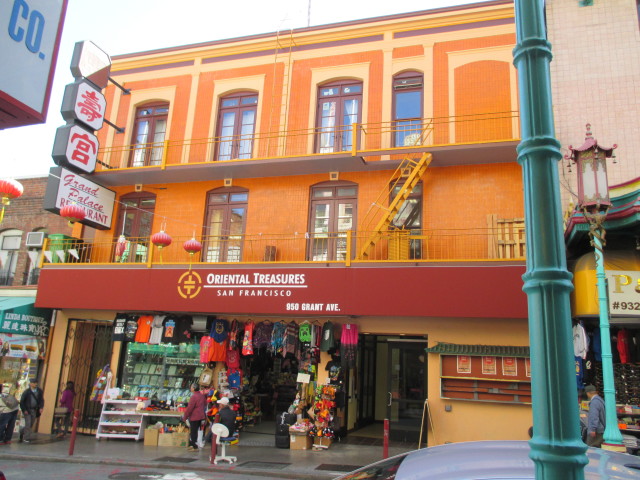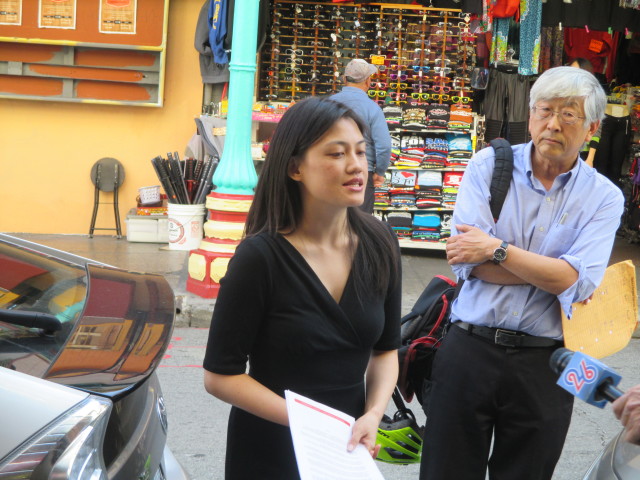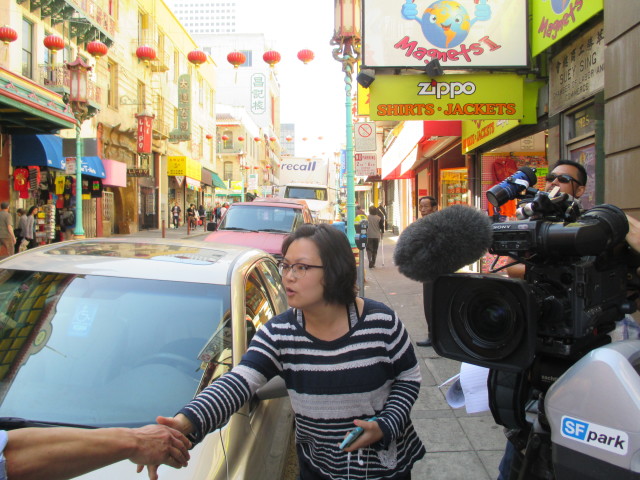Community leaders worry that neighborhood-serving businesses will be forced out by offices that violate local zoning laws

By Tim Redmond
APRIL 30, 2015 – The creep of illegal tech offices into neighborhood commercial districts, which we have been tracking in the Mission, has arrived in Chinatown.
At a press conference yesterday, members of the Chinatown Community Development Center and the Chinese Progressive Association pointed to a building at 950 Grant – where restaurant space has been converted to offices.
The zoning laws don’t allow general office use in the area.
Among the tenants of the new office space is the tech company Whil, which offers “a digital training platform for mindfulness and Yoga.”
But Gen Fujioka, the policy director for CCDC, told reporters that since 1986, central Chinatown has banned this sort of commercial office use. The Chinatown Area Plan, he said, “was created to protect Chinatown from office encroachment.”

The high rents that can be charged for tech offices drive out community-serving small businesses, he noted.
Cindy Wu, a community planner at CCDC who also sits on the San Francisco Planning Commission, said that the Planning Department is going to issue an enforcement notice mandating the removal of the office use.
She and Fujioka said they’re worried that this could be the start of a dangerous trend – as building in Chinatown become vacant, landlords are going to be looking for tenants who can pay the highest possible rent – and right now, that’s tech offices.
In fact, J.K. Dineen, the Chron’s commercial real-estate reporter, asked if community leaders were worried about the Empress of China building – which, he said, had been advertised as potential office space.
“That,” said Fujioka, “would be a very dangerous precedent.”
Wu said that landlords might be misleading tenants by telling them that the space was available for office use – and in fact, the woman who runs the office at 950 Grant, Jenny Chan, joined the press event to tell reporters that she had no idea that her business was in violation of zoning laws.
The landlord, she said, “told me it was commercial space.”

Chan operates a company called 1920C, which she told me is a “coworking space” that rents out desks by the hour, day, week, and month. She said that some of the tenants are nonprofits.
She posted a blog yesterday responding to the press conference, saying “we operate in a mixed-use development space with families living in the residential space upstairs and retail on the bottom.”
However, a Nov. 20, 2012 building permit issued for renovation work on the space states clearly that the city mandates “two retail units per floor, none over 2,500 square feet.”
The building owner did not return emails seeking comment.
Wu said this was the first example she’d seen of tech-office creep in Chinatown, and she’s convinced that the planners will respond – and she wants to see that happen anywhere there are illegal offices.
“The Planning Department should take on these cases immediately,” she said
Among the problems with these underground conversions: Office space typically attracts far more employees per square foot than retail or restaurants. That means more demand for Muni and housing.
Office developers have to pay fees to the city to offset those costs – and developers who convert other types of space to office use are liable for those fees.
But if the conversions happen without permits and in defiance of neighborhood zoning, then the city loses money.
It’s not as if the landlord – listed on the building permit as JQ Properties LP – can’t find tenants, Fujioka said: The vacancy rate in Chinatown is below five percent, and there are lots of community-serving business looking for space.
But those businesses can’t pay as much rent as offices can. Chan said as much to me when she told me that the only way she could afford the rent on the place was to bring in tech companies.
I feel bad for her if, in fact, she was misled into thinking the space was legal for offices. “Landlords,” Wu said, “need to understand the Planning Code.”
Zoning exists for a lot of reasons, but one of them is to keep property values at a level that community-based businesses can afford. And while the City Planning Department’s enforcement division is overwhelmed right now with Airbnb issues, you’d think that the city could at least make sure that flagrant, obvious violations are addressed – so that other landlords don’t think they can follow the modern tech model of doing whatever the hell they want, and asking for permission later.






